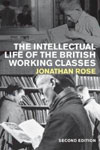This is a brilliant book for all people interested in the history of the working class . How good books, music and fine art moved the long revolution forward for the poor, uneducated masses, from the pre-industrial era to the twentieth century. All thinking people will be inspired by the memoirs, social surveys, statistics and research into how the working classes educated themselves.
One chapter entitled ‘What Was Leonard Bast Really Like?’ gives the reader a completely new insight into the author of ‘Howards End’. Anyone familiar with the story will know that Leonard Bast is the working class character trying to educate himself but E. M. Forster portrays him as pathetic, hopelessly trying to acquire culture from the intelligentsia, and ‘inferior to most rich people’. Another character, Margaret Schlegal, comments ‘His brain is filled with the husks of books, culture – horrible; we want him to wash out his brain.’ This chapter analyses the attitudes of some of the educated middle class authors of the time and is an example from only one part of this vast and very important book.
What is described and thoroughly researched is how many working class people acquired their knowledge and showing that the best of culture is for everyone. After 1945 the working class movement for self education rapidly declined for a number of reasons and this why the author states ‘this is a success story with a downbeat ending’.
Jonathan Rose cannot be praised enough.





